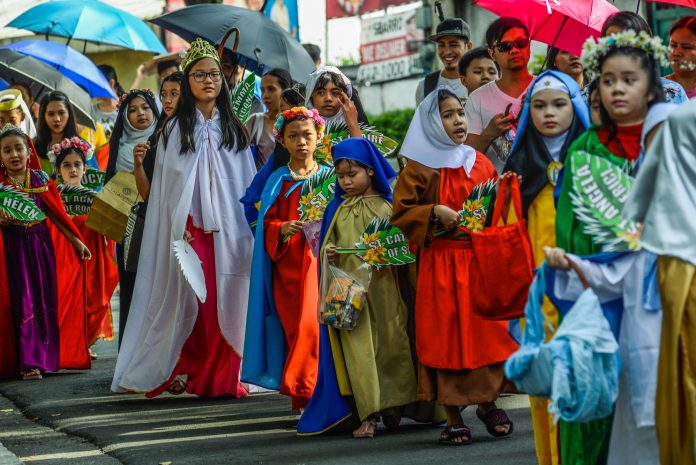Today, let us remember that All Saints Day is dedicated to the nameless. There are saints with specific dates assigned to them: January 28 for Thomas Aquinas, July 31 for Ignatius of Loyola, October 11, for Pope John XXIII, and so on. Special people are deservedly given special days.
But the first of November is for the nameless friends of God. These are the people who followed God’s will – many of them didn’t know they were following God by simply following their conscience – but who are never recognized for doing such.
The reply of Lorenzo Ruiz to his captors is documented, “If I have a thousand lives, I will offer them to God,” and the writings of John of the Cross are still studied by literature students.
But the cries of the nameless victims of Yolanda, Ondoy, or Pablo, went together with them, sometimes to unnamed graves.
The final words of Thomas More are recorded for posterity, “I am the king’s faithful servant, but God’s first.” Still, we no longer can hear the words of Filipino martyrs who believed, in the darkest years of our history, that it was a God-given duty to go to the hills to oppose the Marcos dictatorship.
Francis was a hero for the environment and his hymn to Brother Sun and Sister Moon is still sung even by those who are doing severe damage to Mother Nature.
But as we get more in tune with increasing industrialization, the voices of those displaced by the mining and logging industries, are now muted.
The difficulties we have in thinking that our deceased relatives and friends are also saints come from a clericalist or monastic notion of sanctity.
A quick survey of all saints that we know will tell us that most of them were the twelve who composed the inner circle of Jesus, popes (Pius X, John XXIII, Paul VI, John Paul II) bishops, (Irenaeus, Ignatius of Antioch, Charles Borromeo) priests (John Mary Vianney, Anthony of Padua,) nuns, (Teresa of Avila, Therese of the Child Jesus, Mother Teresa of Calcutta).
There are lay people, but most of them became saints in the context of church missions. Examples of such are our very own Lorenzo Ruiz and Pedro Calungsod.
Other lay people displayed extraordinary virtues like Maria Goretti or miraculous powers like St. Rock.
Even among the living, it is common to think that the saintly are those who join pilgrimages, go to Church often, read the Bible daily, and pray the breviary regularly.
We do not consider saintly a mother, who has no money to join retreats but who struggles to make a living and send her children to school while she has to bear the pontification of the churchy flock who tell her how she should practice holiness and morality.
We consider the financial donors to the Church as among God’s anointed, but not those who are trying to eke out a living.
Lest we forget, there are also those who were deliberately muted by a government whose chief considers opposing views unpleasant to his ears.
The voicelessness of ordinary people in our collective memory goes hand-in-hand with our tendency to romanticize the canonized saints.
Certainly, many of these saints displayed extraordinary virtue and intelligence. For instance, the writings of Thomas Aquinas are difficult to parallel and the bravery of missionaries who went to lands previously unknown is the stuff of legends.
These saints-heroes are now considered as an intermediary between the disciples on earth and a God who is otherwise difficult to reach.
Indeed, in popular discourses, God is pictured as a monarch with several assistants. Since God is far away, people need intercessors who are closer to the Deity.
This is an elevation of the padrino system to the realm of the heavenly.
But since not all have the calling to greatness, can we not emulate the saints in their ordinariness?
Our devotion to Mary the mother of God can be a case in point. We picture her as an extraordinarily beautiful, mother inviolate.
But can we not honor a mother who was a peasant, who at one point in her life had to share a stable together with smelly sheep, who shared the hope of Israel that someday God would cast the mighty from their thrones, whose family was displaced because of the political machinations of Herod, who had to struggle to understand a son whose radical lifestyle was bringing her some troubles, but who followed her Son all the way to his execution?
The saints are our brothers and sisters, who share our common humanity and who struggle together with us. But many of us do not consider ourselves saints, and rightly so.
One ceases to be a saint when one thinks he or she is saintly. Real saints are painfully aware that they are far from the persons God wants them to be.
But on the other hand, is not our inability to consider the possibility that we are saints, or at least called to be holy, arising from our image of a heroic ideal, most often defined in terms that only those directly associated with the official Church can live?
Let us go back to the nameless saint. Is it, not our task to hear the voiceless ordinary people in our society? Long before they are mere members of “the faithful departed’ or the “forgotten souls in purgatory,” they are actually reduced to statistical figures even while they are still alive.
Fortunately, God has other plans. Those who were muted here on earth have always been heard by God. To them, we now plead, “PRAY FOR US.”
Fr. Ramon D. Echica is the Dean of Studies of the San Carlos Major Seminary. He obtained his doctorate in Sacred Theology from the Catholic University of Leuven (Katholieke Universiteit Leuven) in 1998.
This article was first released by Fr. Echica in 2020 and republished in 2023.









